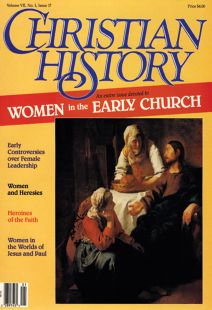From the Archives: The Wife’s Domain
A number of women greatly influenced John Chrysostom's life. He credited his mother, Anthusa, with much of his spiritual growth; he was a friend of Macrina, sister of Basil of Caesarea and Gregory of Nyssa; and he carried on a close correspondence with the Christian heiress-philanthropist Olympias. His banishment late in life stemmed from his opposition to Empress Eudoxia.
One finds in John's writings a hint of respect for the abilities of women, something often missing in the literature of the 4th century. But he also followed his times in relegating women to private life as this sermon excerpt shows:
A WIFE HAS JUST ONE PURPOSE: to guard the possessions we have accumulated, to keep a close watch on the income, to take charge of the household. Indeed, this is why God gave her to you, that in these, plus all other matters, she might be a helper to you.
Our life is customarily organized into two spheres: public affairs and private matters, both of which were determined by God. To woman is assigned the presidency of the household; to man, all the business of state, the marketplace, the administration of justice, government, the military, and all other such enterprises. A woman is not able to hurl a spear or shoot an arrow, but she can grasp the distaff, weave at the loom; she correctly disposes of all such tasks that pertain to the household. She cannot express her opinion in a legislative assembly, but she can express it at home, and often she is more shrewd about household matters than her husband. She cannot handle state business well, but she can raise children correctly, and children are our principal wealth. At a glance she can detect the bad behavior of the servants and can manage them carefully. She provides complete security for her husband and frees him from all such household concerns, concerns about money, woolworking, the preparation of food and decent clothing. She takes care of all other matters of this sort, that are neither fitting for her husband’s concern nor would they be satisfactorily accomplished should he ever lay his hand to them—even if he struggled valiantly!
Indeed, this is a work of God’s love and wisdom, that he who is skilled at the greater things is downright inept and useless in the performance of the less important ones, so that the woman’s service is necessary. For if the man were adapted to undertake both sorts of activities, the female sex could easily be despised. Conversely, if the more important, most beneficial concerns were turned over to the woman, she would go quite mad. Therefore God did not apportion both duties to one sex, lest the other be displaced and be considered superfluous. Nor did God assign both to be equal in every way, lest from equality a kind of struggle and rivalry should again arise, for women in their contentiousness would deem themselves deserving of the front-row seats rather than the man! But taking precautions at one and the same time for peace and for decency, God maintained the order of each sex by dividing the business of human life into two parts and assigned the more necessary and beneficial aspects to the man and the less important, inferior matters to the woman. God’s plan was extremely desirable for us, on the one hand because of our pressing needs and, on the other, so that a woman would not rebel against her husband due to the inferiority of her service. Understanding all these things, let us strive for just one goal, virtue of soul and nobility of behavior, so that we may enjoy peace, live in concord, and maintain ourselves in love unto the end.
(From Chrysostom's "The Kind of Women Who Ought to Be Taken as Wives"; translated by Elizabeth A. Clark. This and the following starred selections are taken from Clark's Women in the Early Church, Michael Glazier, Inc., 1983. Used by permission.)
By John Chrysostom
[Christian History originally published this article in Christian History Issue #17 in 1988]
Chrysostom was a leading fourth-century bishop and patriarch of Constantinople.Next articles
From the Archives: Egeria at Thecla’s Shrine
Egeria made the trek from western Europe and kept a diary of her travels.
EgeriaWomen and the Early Church: Recommended Resources
Historical writings and pespectives, Scripture studies, bibliographies about early church women.
the EditorsHistory of Russian Christianity: From the Publisher
Introduction to the Millennium of Russian Christianity.
the EditorsHistory of Russian Christianity: Did You Know?
Fascinating facts about Russian Christianity.
the Editors



